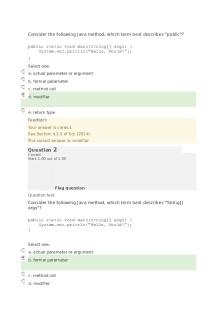Budgets are used for all of the following Except PDF

| Title | Budgets are used for all of the following Except |
|---|---|
| Author | Sima Re |
| Course | Project Management |
| Institution | Algonquin College |
| Pages | 2 |
| File Size | 32.1 KB |
| File Type | |
| Total Downloads | 25 |
| Total Views | 153 |
Summary
Budgets are used for all of the following Except, practice...
Description
Budgets are used for all of the following EXCEPT: A. planning for the future. B. controlling operations. C. directing operations. D. recording actual results. Answer: D Strategic planning involves: A. setting short-term goals that extend one year into the future. B. setting long-term goals that extend 5-10 years into the future. C. setting goals for next month. D. executing directives from the board of directors. Answer: B A rolling budget is a budget that: A. is continuously updated, so that the next 12 months of operations are always budgeted. B. extends 5-10 years into the future. C. begins with zero for each expense, and then amounts are added in. D. is rolled out by upper management. Answer: A When developing the budgets each year, most companies use: A. a top-down approach. B. zero-based budgets. C. participative budgeting. D. slack-based budgets. Answer: C Which of the following is a potential disadvantage of participative budgeting? A. Managers may build slack into the budget. B. Managers are more likely to be motivated by budgets they helped to create. C. Managers should have more detailed knowledge for creating realistic budgets. D. None of the above are true. Answer: A Managers may intentionally build slack into the budget: A. because of certainty about the future. B. to make their performance look worse. C. to have the resources they need in the event of budget cuts. D. because of all of the above. Answer: C Managers may intentionally build slack into the budget: A. because of uncertainty about the future. B. to make their performance look better. C. to have the resources they need in the event of budget cuts. D. because of all of the above. Answer: D The budget committee: A. rarely has the final say on the budget. B. usually is made up of the accounting staff. C. usually is made up of the Board of Directors. D. usually is made up of managers from all areas of the value chain. Answer: D The budget committee does all of the following EXCEPT: A. reviews submitted budgets.
B. removes unwarranted slack. C. approves the final budget. D. determines the bonuses awarded to those who achieve budget targets. Answer: D Which of the following is the starting place for budgeting? A. Last year’s budget B. Last year’s actual amounts C. Zero D. Any of the above Answer: D Which of the following is an advantage of zero-based budgeting? A. It is time consuming. B. It is labor intensive. C. It forces managers to justify every dollar put in the budget, so some expenses may be lower than they were in previous years. D. All of the above are advantages. Answer: C Which of the following budgets is part of the financial budgets? A. Sales budget B. Cash budget C. Direct materials budget D. Operating expense budget Answer: B Which of the following budgets is part of the financial budgets? A. Capital expenditure budget B. Direct labor budget C. Budgeted income statement D. Manufacturing overhead budget...
Similar Free PDFs
Popular Institutions
- Tinajero National High School - Annex
- Politeknik Caltex Riau
- Yokohama City University
- SGT University
- University of Al-Qadisiyah
- Divine Word College of Vigan
- Techniek College Rotterdam
- Universidade de Santiago
- Universiti Teknologi MARA Cawangan Johor Kampus Pasir Gudang
- Poltekkes Kemenkes Yogyakarta
- Baguio City National High School
- Colegio san marcos
- preparatoria uno
- Centro de Bachillerato Tecnológico Industrial y de Servicios No. 107
- Dalian Maritime University
- Quang Trung Secondary School
- Colegio Tecnológico en Informática
- Corporación Regional de Educación Superior
- Grupo CEDVA
- Dar Al Uloom University
- Centro de Estudios Preuniversitarios de la Universidad Nacional de Ingeniería
- 上智大学
- Aakash International School, Nuna Majara
- San Felipe Neri Catholic School
- Kang Chiao International School - New Taipei City
- Misamis Occidental National High School
- Institución Educativa Escuela Normal Juan Ladrilleros
- Kolehiyo ng Pantukan
- Batanes State College
- Instituto Continental
- Sekolah Menengah Kejuruan Kesehatan Kaltara (Tarakan)
- Colegio de La Inmaculada Concepcion - Cebu















